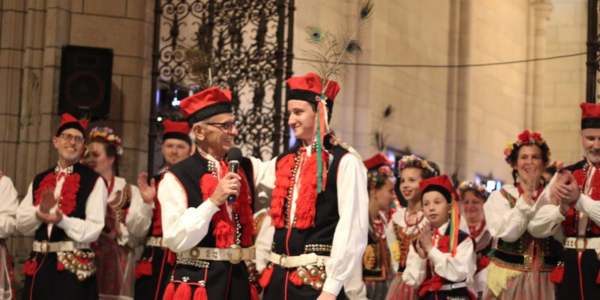
PolishFest 2024, an annual celebration hosted on Pitt’s campus, took place in the Cathedral Commons on Nov. 10. Although the festival’s name focuses on Poland, its programming encompasses all of the nations nestled within Eastern Europe. The festival describes itself as not only Polish, but also as “Lithuanian, Hungarian, and Carpatho-Rusyn.”
While the Cathedral’s first floor is typically packed with Pitt students completing assignments or cramming for exams, it was busy with the addition of community members and families excited to share their enthusiasm regarding Polish culture.
Food offerings included classic Polish dishes such as pierogies, sauerkraut and kielbasa. Live performances, advertised as “Polish folk songs with a violinist; a Lithuanian choir with Bocjai folk songs, Polish Karazula folk songs and folk dancing by the ‘Lajkoniki’ Ensemble, Polka dancing; and contemporary Polish music,” were placed in the center of the room. Audiences were able to view song and dance presented in traditional Polish attire known as “stroje,” identified by its colorfully patterned fabric.
Surrounding the entertainment was a fair of vendors selling Eastern European-related goods, some centering the holiday season. One of these was local business “Cute as a Dumpling,” which offers Pierogi-themed ornaments and tree toppers. The business is owned by Kelly Sobczak, who works closely with a family-owned felt business in Nepal to bring her designs to life. Her sister, Stephanie Sobczak, was manning the station the day of the festival. The business’s catalog ranges from a Pierogi with a Polish flag to a Pittsburgh Steeler Pierogi to a Pierogi holding a blue-and-gold heart.
“She’s been working with them for a number of years … a couple years ago, she said, “I want a Pierogi,” and the guy said, “Why would anyone want a Pierogi on their Christmas tree?” She said, “Well in my hometown, Pittsburgh, whether you have Polish roots or Eastern European roots, people love Pierogi … they make people smile,” Sobczak said.
A local nonprofit, the Ukrainian Cultural and Humanitarian Institute, also held a booth at the event, selling original artwork created by Ukrainian children who have been orphaned or displaced by the ongoing conflicts within the nation. The organization aims to support the children via fundraising, advocacy and hands-on support.
“Poland has been a very strong supporter of Ukraine … We’re here at this great event, this very festive event, to celebrate that cooperation, you know, and hopefully raise a little funds to help the children,” Stephen Haluszczak, a Carnegie resident who has served as the president and founder of the nonprofit since 2002, said.
Other vendors included those selling traditional Eastern European jewelry, clothing and baked goods. The festival also allotted for a variety of free activities, like St. Andrew’s fortune telling — predicting the future via the shape of solidified wax in preparation for St. Andrew’s Day, the patron saint of marriage, on Nov. 30. Other offerings included Lithuanian angel papercutting demonstrations and a “Snowball Toss” for children.
Pitt Polish Studies was present at the event, advertising their offerings and exhibiting examples of Polish folk art, including paper cut-outs and intricately-carved wooden plates, two cultural and decorative staples across Eastern Europe. Bella Woodrow, a junior business student, and Adela Holland, a sophomore pre-pharmacy student, both assisted with the table.
“We’re just basically trying to expand it, to get people to know more about it, to know that it exists, to know about the culture and how interesting it is,” Holland said.
PolishFest is held annually through a collaborative effort within the Pittsburgh Polish-American community, allowing everyone to experience the cultural practices within Poland and its surrounding areas. Those interested in future events are encouraged to follow the festival on its social media page or to engage with Polish culture through the University’s offerings via Polish Studies at Pitt.
Wendy Moore, photo by Kyla Mitchel

